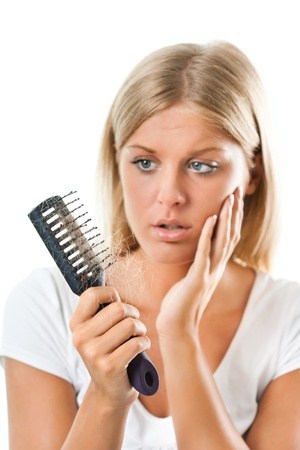
“The change”–that is menopause–can be a daunting time in a woman’s life.
Menopause is defined as the point when a woman’s menstrual period has ceased for one year, marking the end of her menstrual cycles. A normal part of a woman’s life, the average age of menopause is 51. The transition to menopause a gradual process, beginning with perimenopause. During perimenopause, which can last several years, hormonal levels fluctuate and women may experience irregular periods, hot flashes and other symptoms. Just as every body is unique, every woman’s experience of menopause will be her own.
If you are a woman in your 40s and 50s and begin to notice your hair is not as lush as it once was, it may be related to menopause. In fact, thinning hair is a commonly seen symptom in women as they reach menopause. While a variety of factors can contribute to thinning hair, aging and hormonal imbalances can often be implicated in hair loss. Estrogen, a female hormone produced by the ovaries, is important in encouraging hair growth. During menopause, estrogen levels decrease and, as a result, the testosterone hormone levels increase. Because of these hormonal ups and downs, hair loss may occur–and the hair that does grow may come in thinner than before. In addition, if you have a family history of female pattern baldness, the problem could start coinciding with the menopausal years.
Hair loss can be caused by a range of factors, so it is important that a doctor provided a proper diagnosis to rule out underlying illnesses or any other problems. Other common causes of hair loss include:
- Anemia
- Thyroid disorders
- Skin conditions such as psoriasis
- Scalp infections
- Stress
- Medications
As your body shifts during menopause, it is important to treat yourself well, minimize stress, and follow a healthy diet. When it comes to a healthy head of hair, lifestyle decisions are crucial.
What Can You Do If You Are Losing Your Hair?
Some hair loss will be temporary, but it can also be progressive, leading to permanent thinning. It is important to address hair loss when you notice it. While nutritional supplements and creams such as minoxidil may help stem hair loss loss, they will not permanently restore hair. A hair transplant is the most effective way to recapture a thick head of hair and combat baldness.
A hair transplant procedure involves removing a strip of hair from another part of the scalp and grafting it in a bald area. The surgery takes about from 4 to 8 hours, depending on the extent work needed to replace the hair. Once a transplant is made, the hair will grow back naturally over the course of several months. The big plus of surgery: a hair transplant is permanent solution to hair loss. Dr. Halaas provides a variety of hair loss solutions such as FUE Hair Restoration and FUG Hair Restoration.
Hair loss can greatly affect self confidence and should be taken seriously. If you are suffering from hair loss related to menopause and would like to know more about hair transplants, contact Dr. Halaas for a consultation.